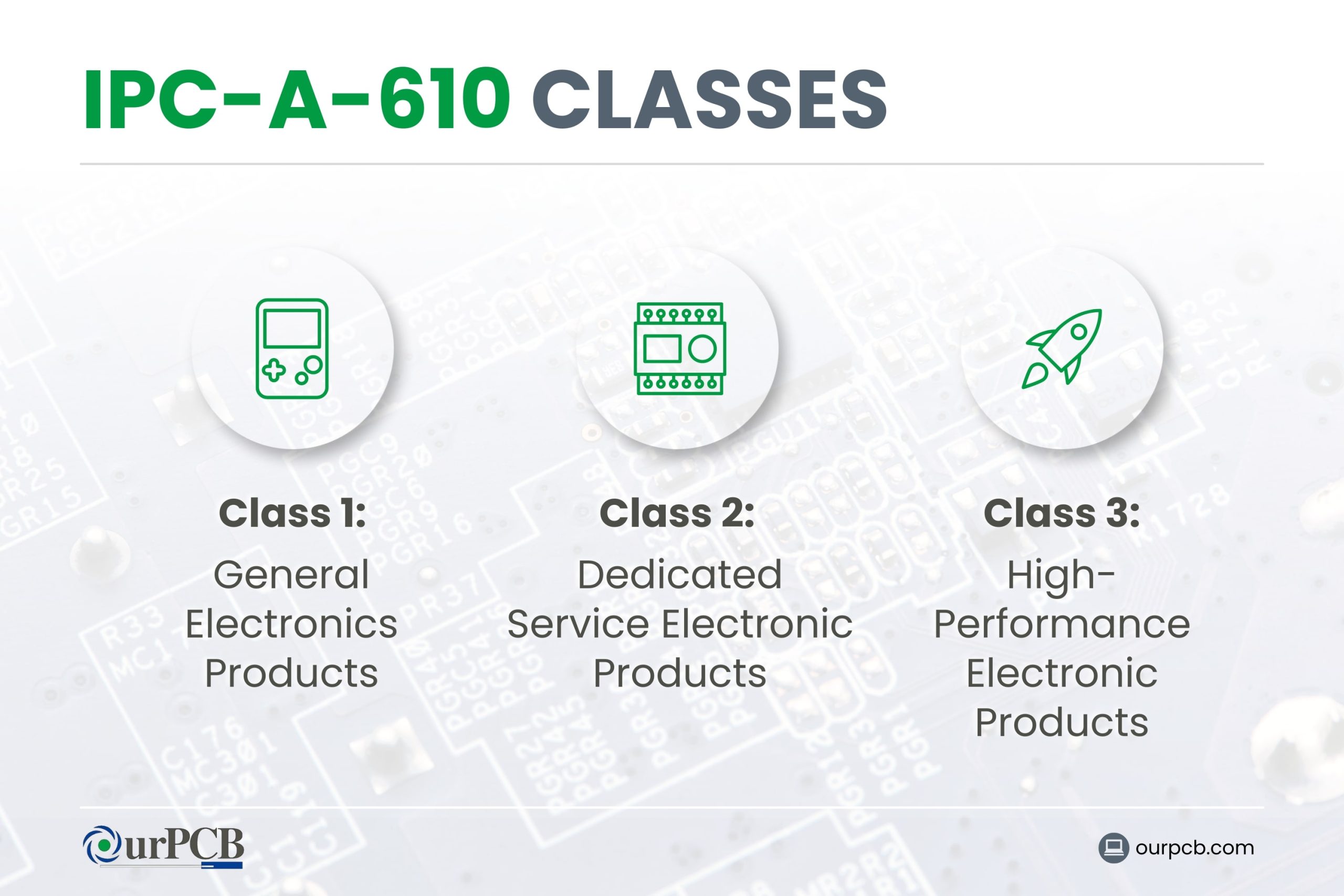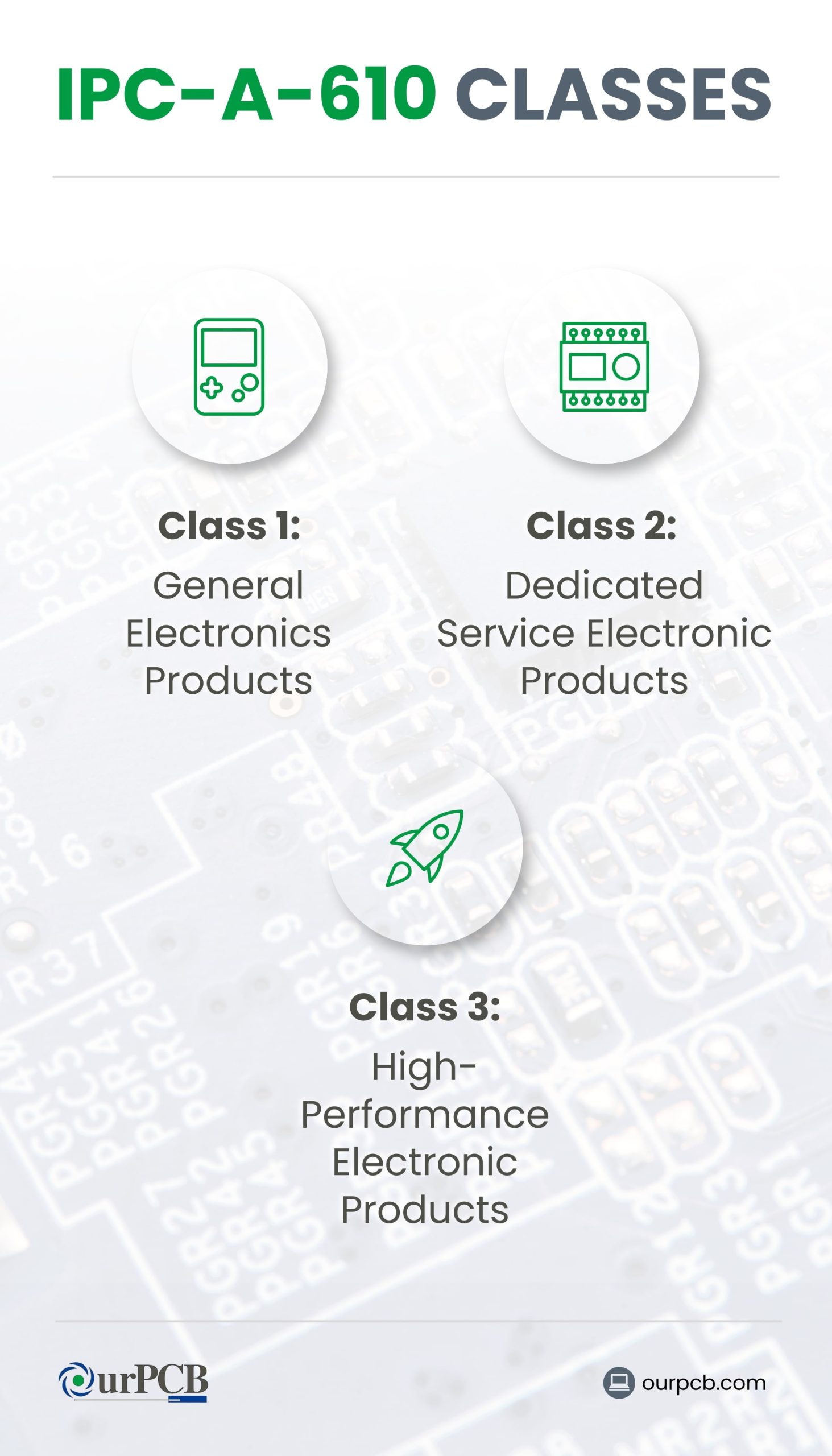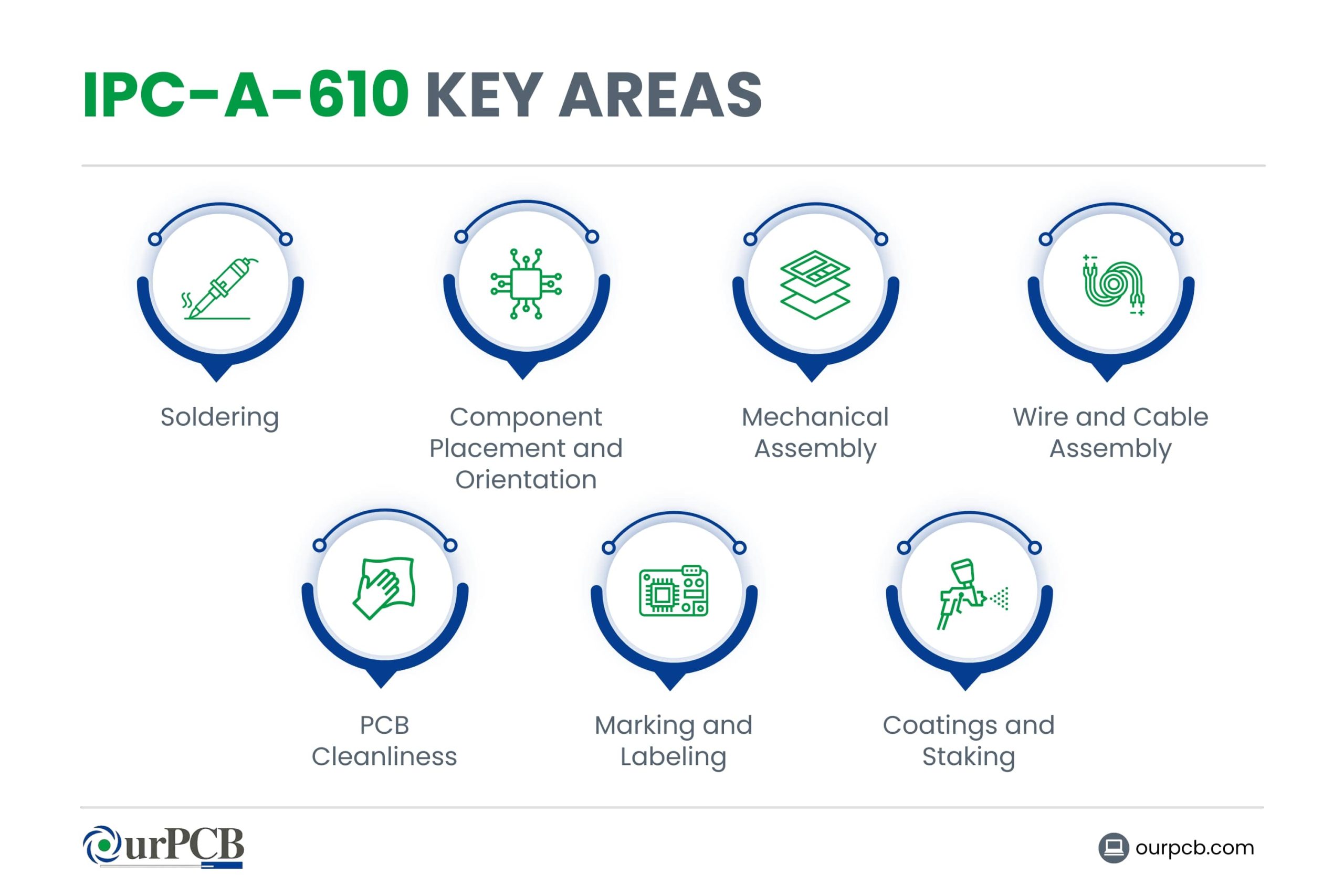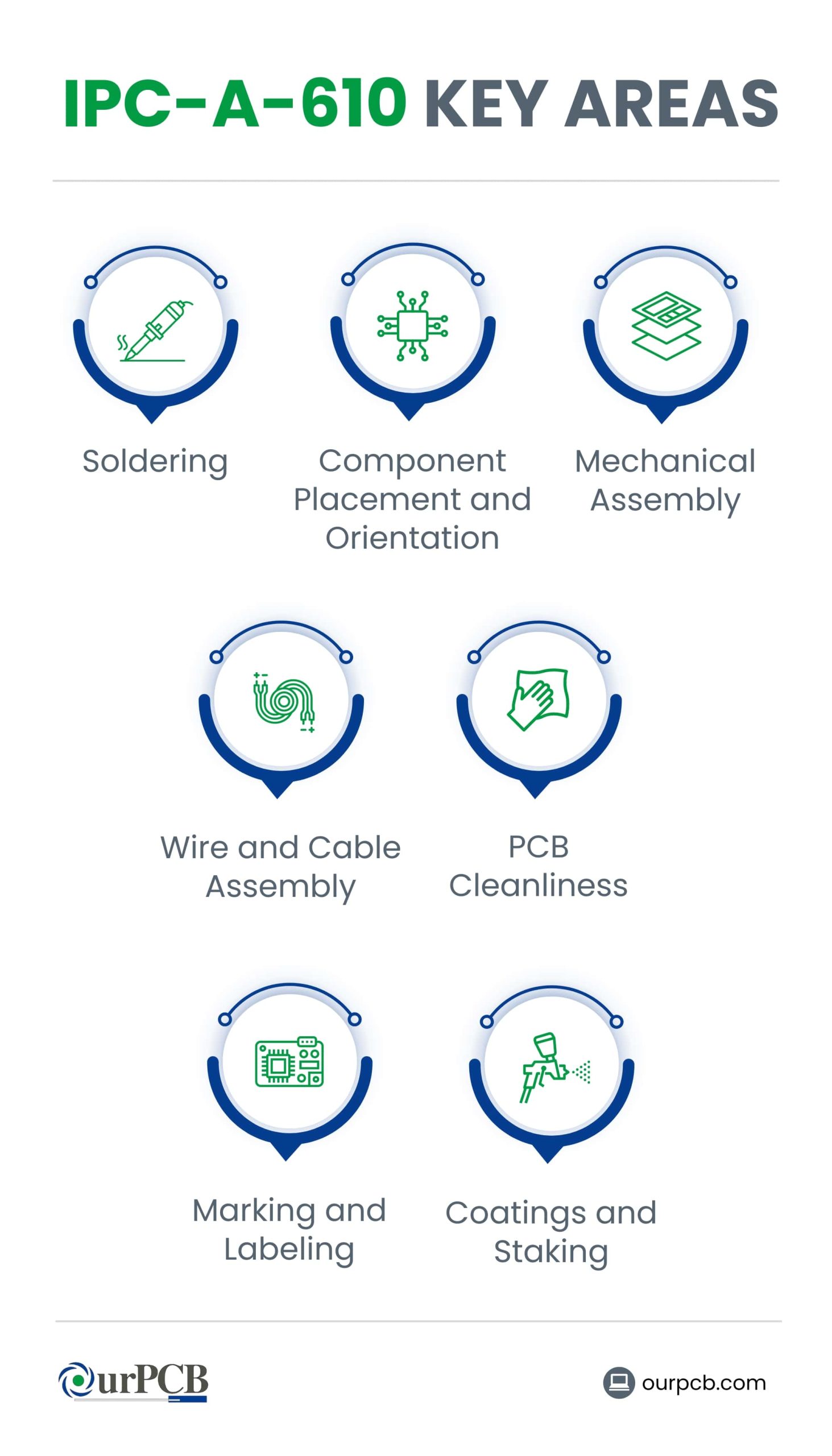The IPC-A-610 standard is synonymous with quality. Its widespread use in various industries like consumer electronics, medicine, and aerospace has made it the de facto end-product acceptance criteria for highly reliable PCBAs.
Since it is the most widely used inspection standard in the electronics industry, IPC-A-610 has earned a reputation internationally, and we want to analyze why most industries use it. Here’s all you need to know about this IPC standard, including its classes and key areas covered.
Contents
- What is the IPC-A-610 Standard?
- What are the Classes of IPC-A-610?
- Class 1: General Electronics Products
- Class 2: Dedicated Service Electronic Products
- Class 3: High-Performance Electronic Products
- Scope and Coverage
- Key Areas Covered by IPC-A-610
- Soldering (Thru-Hole and Surface-Mount)
- Component Placement and Orientation
- Mechanical Assembly (Hardware, PCB Integrity)
- Wire and Cable Assemblies
- PCB Cleanliness
- Marking and Labeling
- Coatings and Staking
- Benefits of IPC-A-610 Compliance
- IPC-A-610 Training and Certification
- IPC-A-610 Revisions and Updates
- IPC-A-610 FAQs
- How can a Company Implement and Use IPC-A-610?
- Are there Options for IPC-A-610 Online and Remote Learning?
- How Long does IPC-A-610 Certification Last?
What is the IPC-A-610 Standard?
The IPC-A-610 standard outlines the specific requirements for evaluating factors like component placement, soldering, marking, and cleaning PCBAs. Therefore, its purpose is to establish globally acceptable criteria for electronic assemblies.
When PCB manufacturers and assemblers follow these outlined approaches for inspection and evaluation, they can ensure their products meet acceptable levels of appearance and functionality.
IPC-A-610 was first released in 1983 but has been through several revisions since then, with revision J being the latest, released in March 2024. However, the key issue that has guided the standard’s formulation over the years is ensuring and maintaining the quality of electronic assemblies.
IPC develops this standard in synergy with J-STD-001 and IPC/WHMA-A-620 to improve the overall performance of PCBAs.
What are the Classes of IPC-A-610?


Class 1: General Electronics Products
As the lowest class in this IPC standard, class 1 is the most lenient regarding the allowance of potential defects. Therefore, it covers electronics assemblies where the primary focus is functionality, not high reliability.
Typical examples include toys, where the quality of the solder joints, component positioning, and cosmetic imperfections are not significant issues. Class 1 is generally applicable to electronic assemblies that don’t necessarily need a long lifespan.
Class 2: Dedicated Service Electronic Products
This class is intended for electronic assemblies that demand higher reliability and better performance than class 1. It allows for a certain extent of imperfection, such as SMT components being slightly off the solder pad. In these instances, the mechanical and electrical connections are okay, but the aesthetics might be off.
Such imperfections are allowed in industrial electronics where reliability is required, but not very critical.
Class 3: High-Performance Electronic Products
A class 3 electronic assembly has the highest quality because it must meet all the IPC-A-610 criteria. These include laminate selection, plating thickness, material selection, manufacturing processes, inspection, etc.
Therefore, the class 3 PCBAs have the highest performance and reliability levels, which enables them to function in harsh and demanding environments.
Producing these assemblies is expensive, so manufacturers and assemblers reserve class 3 for products that can have serious consequences, such as fatalities, if they fail. These include assemblies for aerospace, military, and medical applications.
Scope and Coverage
While IPC-A-610 covers the visual acceptability of electronic assemblies, it does not address aspects like design rules and testing (functional, environmental stress, etc.). Visual acceptability primarily looks at features like the shape, size, and workmanship of the solder joints, component placement, and PCB cleanliness.
Special Offer: Get $100 off your order!
Email [email protected] to get started!
Key Areas Covered by IPC-A-610


Soldering (Thru-Hole and Surface-Mount)
Soldering is essential in PCBAs. IPC-A-610 covers this area with:
- Solder Joint Formation: The joint should be uniform and consistent with no voids, excessive solder, or bridging. The solder should wet the pad completely to form a uniform, consistent, continuous joint.
- Solder Joint Fillet: The fillet should be smooth and concave, transitioning visibly from the pad to the top. It should be cone-shaped with flat or concave sides around the lead in both thru-hole and surface-mount components.
- Solder Joint Strength: The joint shouldn’t have visible cracks or fractures. It should be mechanically strong to withstand the assembly, testing, and daily use stresses.
Component Placement and Orientation
Correct component placement is also important before soldering. IPC-A-610 covers the following areas:
- Component Orientation: All THT and SMT components should be aligned in the direction specified in the assembly document, with the orientation of polarized components verified.
- Spacing: Components should be correctly spaced to avoid mechanical interference, give proper clearance, and leave enough room for assembly and testing.
- Mounting: THT component leads should be trimmed and bent to the correct length, then inserted at the correct angle to ensure proper solder joint formation. On the other hand, SMT component leads should sit properly on the pads, and the components held in place or not moved before soldering.
Mechanical Assembly (Hardware, PCB Integrity)
IPC-A-610 details the thread engagement rules and torque specifications for fasteners in mechanical assemblies to ensure they remain secure during use. The standard also addresses factors like delamination limits and PCB warpage to prevent board damage and ensure the components function optimally.
Wire and Cable Assemblies
According to IPC-A-610, the key requirements for wire and cable assemblies include:
- Proper wire termination methods (soldering and crimping)
- Correct connector crimping at the cable ends
- Adequate strain relief requirements for wires
- Proper wire stripping techniques
- Correct wire bundling and routing
- Acceptable bend radius to prevent conductor damage inside
- Inspection for visible defects or damages to the wire
- Compliance with the cable’s specified mechanical and electrical characteristics
PCB Cleanliness
IPC-A-610 specifies the electronic assembly should undergo cleaning to remove debris, flux residue, and other contaminants that can affect the circuit’s reliability. The cleaning agent should not damage the PCBA, so the cleaning method should be appropriate for each electronic assembly.
This standard also lists rules for handling and storing PCBAs after assembly to prevent contamination.
Marking and Labeling
The standard outlines the criteria for marking and labeling components, PCBs, assembly, location, and orientation data using the appropriate identification codes or symbols. These marks or labels should be legible, permanent, and positioned in a visible area.
IPC-A-610 also details the data that should be included in the labels, such as serial numbers, safety markings, production date codes, etc.
Coatings and Staking
IPC-A-610 states that an electronic assembly can be coated with a conformal coating to protect the circuit from environmental factors, such as dirt, moisture, and chemicals. This coat should be uniform with no bubbles, voids, or other defects that affect the circuit’s reliability.
The conformal coating material and thickness should also be appropriate for the specific application. These two factors should not affect the circuit’s functionality, reliability, or performance.
Benefits of IPC-A-610 Compliance
- Improved Product Quality: IPC-A-610 helps reduce workmanship errors and defects by lowering the risk of component failure and improving the product’s overall efficiency.
- Enhanced Reliability: Adhering to this standard, especially class 3, when producing electronic assemblies ensures the devices remain reliable over the long term while delivering optimal performance.
- Standardized Quality Assurance: IPC-A-610 compliance establishes consistency in electronic assembly production to reflect the best industry practices. Ultimately, this standardization and consistency leads to better customer satisfaction, trust, and loyalty.
- Reduced Manufacturing Costs: Since the standard helps to minimize production errors and defects, the high costs associated with reworks and warranty claims will be reduced, resulting in lower production costs.
IPC-A-610 Training and Certification
IPC-A-610 training provides various certification programs, which include:
- CIS (Certified IPC Specialist): Suitable for engineers, as well as assembly, inspection, and quality control staff. It takes 3 days to complete.
- CSE (Certified Subject Expert): Best suited for staff who require advanced knowledge of the IPC standard to assist with conflict resolution or staff liaison. This training takes 4 days.
- CIT (Certified IPC Trainer): Suitable for delegates who want to provide internal CIS training. It also takes 4 days to compete.
This training is important for individuals and companies because it covers various critical areas in electronics production, such as:
- Criteria for cleaning and coating
- Jumper wire assembly
- Criteria for component damage and PCB laminate conditions
- Component mounting
- Criteria for surface mount soldering, including leaded and leadless chips and chip components
- Solder fillet criteria for major SMT component groups
- Criteria for soldering through-hole components
- Swaged hardware and heat sink requirements for mechanical assemblies
IPC-A-610 Revisions and Updates
The IPC-A-610 and other IPC standards are regularly updated by an expert committee to keep up with the demands of the rapidly changing electronics industry.
For instance, revision H was released in 2020 after participants from 29 countries provided their input and expertise to create the document. The update included new SMT component types and removed target conditions.
Published in March 2024, revision J is the most recent update. Participants from 31 countries added their input and expertise to the creation of this document. This revision is a must-have for operators, inspectors, and all other technicians with an interest in the acceptance criteria for electronic assemblies.
IPC-A-610 FAQs
How can a Company Implement and Use IPC-A-610?
After training its staff, a company can implement and use IPC-A-610 by setting clear workmanship, component mounting, soldering, and inspection criteria. Laying out these guidelines will reduce errors in the manufacturing and assembly processes and defects in the final product.
Are there Options for IPC-A-610 Online and Remote Learning?
Yes. IPC-A-610 can be taught at training centers, on your company’s premises, or remotely (online) via platforms like Zoom and Teams. The online training option is convenient, flexible, and affordable for those who cannot go to the training centers.
How Long does IPC-A-610 Certification Last?
All IPC certifications, including IPC-A-610, are valid for 2 years. After that, you have to undergo re-certification to ensure you are up to date with the latest revisions.
Back to top: Complete Guide to IPC A-610 Standards for Electronics Manufacturing
Special Offer: Get $100 off your order!
Email [email protected] to get started!







